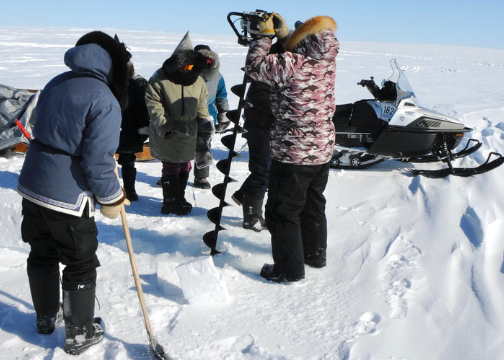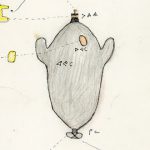Learning Outcome
Read elders’ words about how to acquire skills by helping others. Inuit develop skills by doing what we are asked to do, and starting to do things on your own. Helping others is healthy for the body and the mind.
Inuit Code of Conduct for Society
This lesson is part of an Inuit Code of Conduct for Society, along with these other lessons:

Picture by Loïc Fauteux-Goulet
How to teach this skill
- Students can read the elders’ stories or the teacher can read and explain them.
- After reading these stories, student can discuss the difference of helping between the past and now.
- Tell them the story again about how Inuit thought it was important to have a helper. You can use your own knowledge or experience to make them understand.
- Tell them to respect the words of their elders. We have come to this day with their help. They have lived a long life, so we have to believe what they say is true.
- Once students have finished reading or listening to the stories, have them write their own thoughts and what they understood on how Inuit used to help each other.
- They could also visit elders, or invite an elder to talk in class about how Inuit used to help each other.
Traditional Inuit Words of Advice
ᐃᓄᐃᑦ ᐱᓇᓱᐊᕐᐸᓚᐅᕐᑐᑦ ᑌᒪᖕᖓᑦ ᐃᑲᔫᑎᑦᓱᑎᒃ, ᐅᕕᒐᕐᑑᒐᓗᐊᕋᒥᒃ ᐃᑲᔪᕋᕐᓴᒥᒃ ᑕᑯᓐᓇᑐᐃᓐᓇᓯᒪᖕᖏᑐᑦ, ᐃᓚᒥᓂᓪᓗ ᑌᒪᖕᖓᑦ ᐃᑲᔪᖁᔭᐅᑦᓱᑎᒃ ᐃᑲᔪᕆᐊᓕᓐᓂᒃ, ᐃᓄᒻᒪᕆᓂᒃ ᐱᓗᐊᖕᖑᐊᓱᑎᒃ, ᑐᑭᓯᒪᒐᒥᒃ ᐃᑲᔪᕐᓂᖅ ᐊᑐᕐᓂᖃᒻᒪᑦ.
Inuit used to work together, help each other all the time. Even the young didn’t ignore those who needed help. And they were told to help their relatives; those who needed help, especially the elders, because they understood that helping was useful.
Helping others
- ᐃᓄᐃᑦ ᓯᕗᓂᑦᓴᓕᐅᕐᑕᐅᕙᓚᐅᕐᑐᑦ ᐃᓄᑦᓯᐊᒍᖁᔭᐅᑦᓱᑎᒃ ᐃᓅᖃᑎᒥᓂᒃ ᐃᑲᔪᐸᖁᔭᐅᑦᓱᑎᒃ
Inuit are raised and prepared for a good future; to be good and to help others.
- ᕿᑐᕐᙰᑦ ᐃᑲᔪᕐᓂᒥᑎᒍᑦ ᐱᒋᐅᕐᐸᓕᐊᓲᒍᒻᒪᑕ ᐃᒻᒥᓂᕿᒋᐅᑐᐃᓐᓇᕋᑕᕐᓱᑎᒃ. ᐱᒋᐅᕐᓵᕆᔭᐅᓐᓂᖏᑦᑐᑦ ᐊᖓᔪᕐᙯᕈᑐᐊᕋᒥᒃ, ᐃᓪᓗᓕᑑᓕᑐᐊᕋᒥᓪᓘᓃᑦ ᐱᓇᓱᐊᓕᓂᐅᖕᖏᒧᑦ ᓱᒃᑯᕈᒐᓱᐊᑐᐃᓐᓇᑐᔮᓯᓲᑦ.
By helping, children learn new skills and then can do things on their own. Those who were not taught, because they did not have parents or they lived alone, seemed to acquire fewer skills.
- ᐊᑖᑕᓗ, ᐊᓈᓇᓗ ᓄᐃᑌᓐᓇᓂᐊᑦᔭᖏᓐᓇᒥᒃ ᕿᑐᕐᖓᒥ ᐱᓇᓱᒐᑦᓴᓂᒃ ᐊᓇᕐᕋᒥ ᐃᑲᔪᕐᓯᒪᑎᑦᓯᒋᐊᖃᓲᒃ. ᑌᒪᖕᖓᓗ ᐃᑲᔪᕆᐊᖃᓐᓂᖓᓂᒃ ᐃᓚᓚᑳᓂᒥᓂᒃ, ᐃᓅᖃᑎᒥᓂᓪᓗ ᖃᐅᔨᒪᑎᑦᓯᒐᓱᐊᕐᓱᑎᒃ.
A father and mother may not always be there, so they get their children to help out at home. Always remember to help relatives, and other people.
- ᑌᒪᖕᖓᑦ ᐱᒋᐅᕐᐸᓕᐊᓂᐊᐱᓕᒫᖓᓂ ᐃᑲᔪᕐᑎᓱᒍ ᐱᔪᓐᓇᑕᖏᓐᓄᑦ ᐊᓇᕐᕋᒥ, ᐊᓇᕐᕋᒥᓪᓗ ᐱᔭᑦᓭᕈᓯᒪᒐᓗᐊᕐᒪᑦ ᐱᕐᖃᔭᖕᖏᑐᓂᒃ, ᐱᔨᖃᖕᖏᑐᓂᓪᓗ ᐃᑲᔪᕐᓯᒪᑎᑦᓱᒋᑦ. ᑌᒪᖕᖓᓂᑦ ᐅᖃᐅᑦᔭᐅᖃᑦᑕᓯᒪᒐᑦᑕ ᐱᔪᓐᓇᓂᕐᓴᐅᔪᑦ ᐊᓯᒥᓂᒃ ᐱᔪᓐᓇᖏᓐᓇᓴᒥᒃ, ᐃᑲᔪᕋᑦᓴᐅᔮᓕᕐᑐᒥᓪᓘᓃᑦ ᑕᑯᓐᓇᑐᐃᓐᓇᕆᐊᖃᑦᔭᖏᒻᒪᑕ ᐱᔪᓐᓇᑐᐊᕈᓂ.
They start to teach them at a young age at home by letting them help with whatever they are able to do. Once everything is done at home, they send them out to help the disabled or those who have no help at home. And we were always told, those who are able are to help those who are not, and not to just ignore those who need help.
- ᑐᕈᓯᐊᐲᑦ ᐱᒋᐅᕋᑕᑦᔭᖏᑦᑐᑦ, ᐃᓱᒪᒋᑐᐃᓐᓇᔭᕈᓐᓀᓗᒋᑦ ᒪᓕᒍᒪᒋᐅᕐᓂᐅᓕᑐᐊᕐᐸᑕ ᒪᙯᑦᑐᓂᒃ ᒪᓕᑦᑎᑕᐅᖃᑦᑕᕆᐊᓖᑦ, ᒪᓕᖃᑦᑕᓂᕐᒥᑎᒍ ᑭᓯᐊᓂ ᐱᒋᐅᕐᐸᓕᐊᒍᓐᓇᒥᔪᑦ.
Before the boys would get older, they would follow the hunters all the time or they would follow other families. Those who were able were not allowed to sit around doing nothing. Parents know they will get older, but they also know that their children will be there to help them.
- ᐃᓄᐃᑦ ᓯᕗᓂᑦᓴᓕᐅᕐᑕᐅᕙᓚᐅᕐᑐᑦ ᐃᓄᑦᓯᐊᒍᖁᔭᐅᑦᓱᑎᒃ ᐃᓅᖃᑎᒥᓂᒃ ᐃᑲᔪᐸᖁᔭᐅᑦᓱᑎᒃ.
When small boys became a little bit bigger, they started to follow their father or their relatives. Those who were able weren’t allow to just sit around doing nothing. Their parents knew that they would get fragile from old-age, and would need their children’s help.
- ᐃᓄᐃᑦ ᓯᕗᓂᑦᓴᓕᐅᕐᑕᐅᕙᓚᐅᕐᑐᑦ ᐃᓄᑦᓯᐊᒍᖁᔭᐅᑦᓱᑎᒃ ᐃᓅᖃᑎᒥᓂᒃ ᐃᑲᔪᐸᖁᔭᐅᑦᓱᑎᒃ .
Inuit are raised and prepared for a good future; to be good and to help others.
- ᓯᕗᓪᓕᕆᕙᓚᐅᕐᑕᕗᑦ ᐊᕐᓱᕈᕐᓯᒪᑦᓴᒪᑕ. ᑕᒪᒃᑯᐊ ᐊᑖᑌᕐᑐᕕᓃᑦ, ᐊᖑᑎᖃᕈᓐᓀᑐᐃᓪᓗ (ᐅᐃᒡᒐᓃᑦ) ᕿᑐᕐᖓᓚᑳᒥᓂᒃ ᐁᑦᓯᑫᓲᒍᒻᒪᑕ, ᑕᒪᓐᓇ ᐱᐅᓯᐅᒻᒪᑦ ᑌᒣᑦᑐᑰᑦᓱ ᓈᔨᑎᑕᐅᓯᒪᒐᓗᐊᕋᑦᑕ ᐃᑲᔪᖃᑦᑕᐅᑎᓂᒃᑯᑦ, ᐃᑲᔪᖃᑦᑕᐅᑎᓂᒃ ᐱᓪᓚᕆᐊᓘᒻᒪᑦ.
Our ancestors went through hard times. Those who lost their fathers and widows would ask their children to help them. That is our way: helping each other is very important.
- ᓯᓚᕐᖃᑎᒥᓂᒃ ᐱᔨᖃᖕᖏᑐᓂᒃ ᐃᓱᒫᓗᑉᐸᖁᔭᐅᕙᓚᐅᕐᑐᑦ, ᑌᒣᑦᓱᓂ ᐃᓅᓯᖅ ᐃᓱᕐᕆᓇᕐᑐᖅ.
We were told to help those who didn’t have any help; this is a great comfort for someone who doesn’t have anyone.
- “ᐃᓄᒃ ᐃᑲᔪᕆᐊᕆᐊᖃᓕᕋᕕᐅᒃ”,-ᓚᔭᐅᕙᑦᓱᑕᓗ. ᐃᒥᕐᑕᓂᖏᓐᓇᓕᒫᕐᓱᑕᓗ ᓱᓇᒐᓚᖏᑦ, ᖁᕐᕕᖏᑦ ᐊᓂᑉᐸᓱᒋᑦ, ᐱᔭᕇᑦᓯᐊᓚᐅᑲᑦᓱᑕ, ᐳᓛᕋᓗᐊᕋᑦᑕ ᐃᑲᔪᕋᑦᓴᐅᑐᐊᕐᒪᑦ ᐃᑲᔪᕐᐸᓱᑕ.
ᑌᑦᓱᒪᓂ ᑭᓇᑐᐃᓐᓇᖅ ᑭᑦᓴᓕᕐᒪᑦ, ᐃᓱᒪᒥᒍᓪᓘᓃᑦ ᐃᓱᐃᓪᓕᐅᓕᕐᒪᑦ, ᐃᓄᐃᑦ ᐃᑲᔪᕐᑏᑦ ᑲᑎᕙᓚᐅᕐᑐᑦ ᐃᑲᔪᕐᓯᒐᓱᐊᓯᑦᓱᑎᒃ ᑌᒣᑦᓯᐊᖏᑦᑐᒥᒃ.
They used to tell us “you have to go help a person”, getting water for them, putting their toilet out, finishing anything there was to do, even when we were just visiting, we would help out.
- ᐅᓪᓛᑯᑦ ᒪᑭᓐᓇᓵᕐᐸᓚᐅᖕᖏᑐᒍᑦ ᐃᓱᒫᓗᒋᔭᖃᕐᑎᑕᐅᑦᓱᑕ ᐱᓇᓱᒐᑦᓴᓚᑳᓂᒃ, ᐃᒪᕐᑕᓂᕐᓂᒃ, ᖁᕐᕕᓂᒃ ᐊᓂᑦᓯᓂᕐᒥᒃ, ᐊᓯᖏᓐᓂᓗ.
We did not sleep oversleep in the morning, we were always thinking about what needed to be done, getting water, taking out the toilet, etc.
- ᐃᓄᐃᑦ ᓯᕗᓂᑦᓴᓕᐅᕐᑕᐅᕙᓚᐅᕐᑐᑦ ᐃᓄᑦᓯᐊᒍᖁᔭᐅᑦᓱᑎᒃ ᐃᓅᖃᑎᒥᓂᒃ ᐃᑲᔪᐸᖁᔭᐅᑦᓱᑎᒃ
Inuit are raised and prepared for a good future; to be good and to help others.
- ᐃᓄᒻᒪᕆᓐᓂᒃ ᐃᑲᔪᕆᐊᖁᔭᐅᕙᓚᐅᕐᑐᒍᑦ ᐃᒥᕐᑕᐅᔨᑦᓱᒋᑦ, ᖁᕐᕕᖏᑦ ᐊᓂᑦᓱᒋᑦ, ᑭᓇᒃᑯᑐᐃᓐᓇᓂᓪᓘᓃᑦ ᐳᓛᕋᓗᐊᕋᑦᑕ ᑕᑯᓐᓇᑐᐃᓐᓇᖁᔭᐅᕙᓚᐅᖕᖏᑐᒍᑦ, ᐱᔭᕇᑦᓯᐊᕈᑦᑕ ᐃᓱᒪᒥᓐᓂᐊᕋᑦᑕ.
They told us to help the elders, get water for them, take out their toilet, and even if we were visiting other people, we were told not to ignore them. When we finished our chores, then we were free.
- ᐃᓄᒻᒪᕇᑦ ᐃᑲᔪᕐᑕᐅᕙᑐᐊᕋᒥᒃ ᐱᐅᓂᕐᓴᖅ, ᐃᓱᕐᕆᓯᐊᕐᓇᓂᕐᓴᖅ. ᑌᑦᓱᒪᓂᒋᐊᖅ ᕿᒣᑐᐃᓐᓇᓲᒍᓐᓂᒪᑕ ᐃᓄᒻᒪᕆᐅᓕᑐᐊᕐᒪᑕ. ᐃᓄᒻᒪᕆᓐᓂᒃ ᑲᒪᑦᓯᐊᑐᖃᖕᖏᑐᐊᕋᒥ ᓱᒃᑯᔫᒥᒍᑕᐅᓂᕐᓴᖅ. ᐃᓱᒪᒐᓱᐊᑦᓯᐊᐸᓐᓂᐊᖁᒍᑦ. ᐊᓈᓇᒃᑯᕗᑦ, ᐊᑖᑕᒃᑯᕗᓪᓗ ᑕᒪᒃᑯᓂᖓ ᐃᓄᒻᒪᕆᓐᓂᒃ ᐱᕐᖃᔭᕈᓐᓀᑐᓂᒃ ᐃᑲᔪᖁᔨᓲᒍᒻᒪᑕ.
Helping our elders feels good. Way back when, the elders were left behind. When elders aren’t taken care of, it makes for a bad person. We always tried to think straight. Our mothers and fathers would tell us to help the elders.
- ᓯᕗᓪᓕᕆᕙᓚᐅᕐᑕᕗᑦ ᐊᑖᑕᖃᕈᓐᓀᕋᒥᒃ ᐊᕐᓱᕈᑦᑐᐊᓘᕙᓚᐅᕐᒪᑕ ᑲᒪᔨᑦᓴᖃᕈᓐᓀᕋᒥᒃ, ᐊᕐᓱᕈᑦᓯᒪᓂᖏᑦ ᓄᐃᑕᕙᒻᒪᑕ, ᐃᑲᔪᕐᑕᐅᓂᕐᒧᑦ ᑭᓯᐊᓂ ᑕᒪᒃᑯᐊ ᑌᒣᑦᑑᕙᓚᐅᕐᑐᑦ ᐊᖏᔪᒥᒃ ᐃᑲᔪᕐᑕᐅᓯᒪᓂᖃᑦᓴᕋᑦᑕ ᐃᓄᓐᓄᑦ, ᐃᓅᖃᑎᒌᓐᓂᑯᑦ ᐃᑲᔫᑎᓂᒃᑯᑦ. ᓯᕗᓪᓕᕕᓂᕗᑦ ᑌᒣᑦᑑᕙᓚᐅᕐᒪᑕ ᑕᒪᒃᑯᓂᖓ ᐃᓱᒪᑦᓯᐊᕆᐊᖃᕋᓗᐊᕋᑦᑕ, ᑕᒪᓐᓇᑕᐅᖅ ᐱᓪᓚᕆᐅᓂᕐᐹᕌᓗᒃ. ᑌᒃᑯᐊ ᓯᕗᓪᓕᕆᕙᓚᐅᕐᑕᕗᑦ ᐊᕐᓱᕈᕐᓯᒪᑦᓴᒪᑕ.
Our ancestors suffered hardships when they lost their parents; you can see their past struggles. That is how they got by, by being helped. We have been tremendously helped by other people, through our Inuit ways. It is important to think about how our ancestors used to struggle. Our ancestors suffered greatly.
- ᐅᖃᐅᑦᔪᑕᐅᕙᓚᐅᕐᒥᔪᑦ, “ᐃᓄᒎᖅ ᐃᓅᓯᕐᒥᓂᒃ ᐱᑦᓯᐊᑐᕕᓂᐅᒍᓂ ᑐᖁᑦᓯᐊᓲᖅ.”
We were also told, “if a person was a good person, they would would die a good death.”
Credits
We would like to thank the following people for sharing knowledge about Inuit traditional ways.
Johnny Manumi Inukpuk
Adamie Niviaxie
Taamusi Qumaq
Eva Ilimasaut
Eyetsiak Simigak
Thomassie Kudluk
Mosesie POV
Mitiarjuk Nappaluk
Raiki Najummi Augiak
Annie Alaku
Pasha Simigak
Qipitaq Arnaituk
Issak Uumajualuk
Naalak Nappaaluk
Annie Grey
Velesie Annahatak
Kusugaliniq Ilimasaut
Tivi Eetok
We would like to thank the following organizations for giving us photos and for categorizing them: Avataq Cultural Institute and Kativik Ilisarniliriniq
We would like to thank the elders who were asked to record by Avataq Cultural Institute.
We would like to thank the following people who compiled and organized information:
Betsy Annahatak
Mary Elijassiapik
Sala Padlayat
Jessica Arngaq

